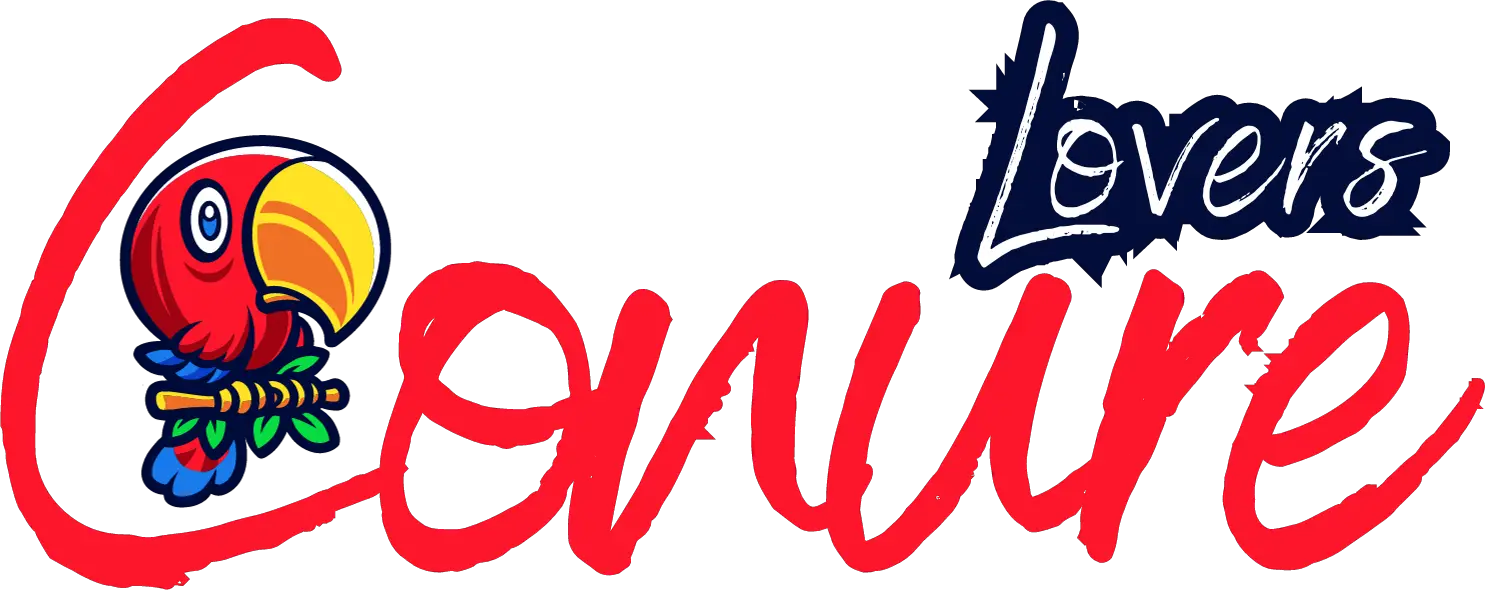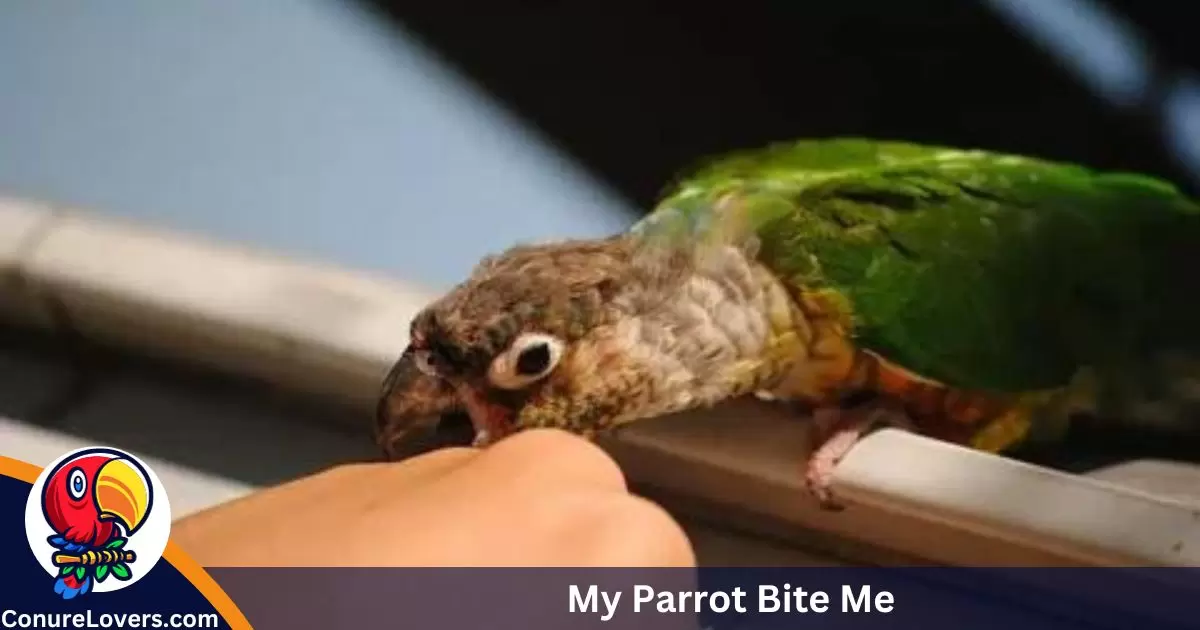“Parrots decide whether to bite or not. When your parrot bites, it’s trying to say something or control the situation. Sometimes, especially during certain times of the year, hormones can make birds a bit more on edge.”
Why Does My Parrot Bite Me? Get ready for the fantastic world of your new feathered friend! Parrots are super smart, but let’s talk about the nitty-gritty of dealing with parrot bites. 🦜
Birds, including parrots, are still kinda wild at heart. Unlike dogs and cats, they’re not fully domesticated, and some wild instincts stick around. One of those quirks is biting – it’s like second nature to them. So, as a bird owner, it’s key to figure out why your bird might nibble on you.
Here’s the deal: when parrots bite, it’s not about hate or wanting to be mean. Think of it from their birdy perspective, and you’ll be a pro at handling or sidestepping those nips!
And hey, understanding your parrot’s quirks can make the journey even more enjoyable!
Why do parrots bite?
Ever wondered why your parrot gives you a nip? Well, there are some reasons behind this beaky behavior. Understanding these situations can help create a chill vibe for your bird and keep you safe too!
First things first, birds are wild at heart, and their bites aren’t about being mean. They usually nibble in response to something. Don’t get all negative about it – understanding why your parrot bites is the first step to finding a fix. Here’s why it might happen:
Exploration:
Sometimes, your bird is just checking things out. When they’re young, they might do this thing we call “beaking” – a light chew or nibble to feel textures. It’s playful, not a full-on bite. If it starts feeling stronger, calmly say “no biting” and move your hand away. Your bird will catch on over time.
As they grow, they figure out who’s family and who’s not. Strangers might be seen as threats, leading to a nip. Even certain family members can trigger biting for reasons not obvious to you. Train your bird to like someone new by having that person offer a special treat after positive interactions.
Self-Defense or Protectiveness:
Birds are naturally protective. They might bite if they’re protective of their cage, play stand, or even you. It’s their way of saying, “Back off, this is mine!” If your bird is attached to you, biting might be a sign of protectiveness. They’re not just seeking attention; they’re trying to keep rivals or perceived threats away.
In my bird crew, each one sees me as their BFF. When they’re out and about, they get territorial. They want me close but don’t want the others near. This territorial behavior sometimes leads to birdie battles – I’ve even gotten a nip trying to break it up!
So, not all multi-bird homes are like mine. It’s a result of each bird bonding with me instead of forming a flock together. Pros and cons, which I might chat about in another post.
Understanding your feathered friend’s world can turn the biting blues into a colorful adventure!
Read Also: Parrot Molting Symptoms (with Pictures) 2024
Is my parrot biting or “beaking” me?
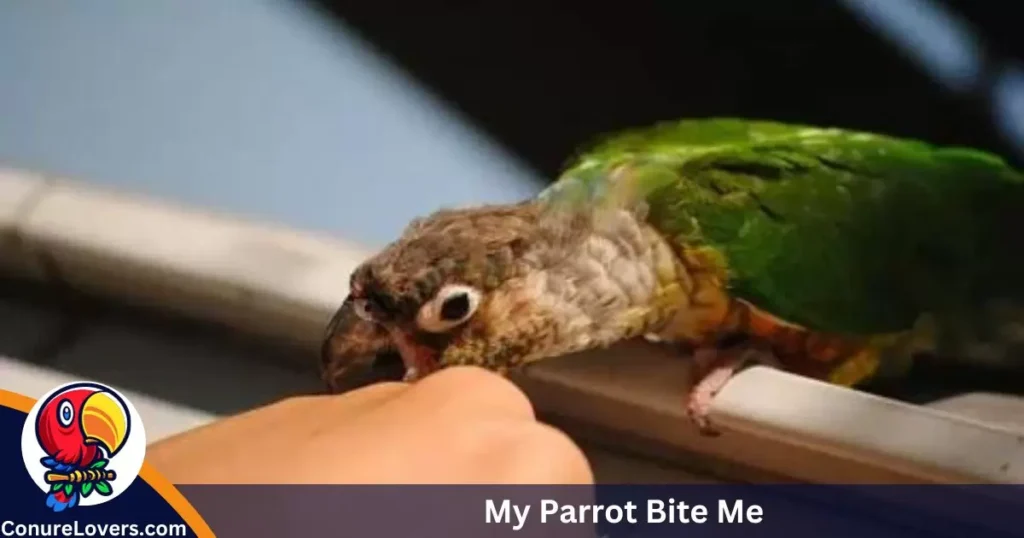
Before you start teaching your parrot good manners, it’s important to know the difference between when they’re playfully exploring (**beaking**) and when they’re actually biting. Beaking is when your bird gently puts its beak on you, more like a friendly touch, not a hard bite.
Because parrots use their beaks for different things like holding stuff and keeping balance, beaking is their way of checking things out. Understanding this helps you respond the right way, encouraging good behavior.
So, if your parrot is being a bit beaky, don’t worry – it’s just their way of saying hello and having a little adventure with their beak!
Why does beaking take place?
Just like biting, there are various reasons why birds use their beak. Firstly, birds often use their beak to test branches and other surfaces before stepping on them. This helps them check how sturdy the surface is and climb structures without falling. When you watch parrots move around, you’ll notice they use not only their feet but also their beaks as a “third foot” to reach out, climb up, and climb down.
So, when a bird reaches out with its beak, it’s often about supporting itself while moving from one place to another.
This might also happen when a bird is perching on the owner’s shoulder or hands before stepping up. For new bird owners, this may seem like the bird is about to bite, but that’s not always the case.
Thirdly, a bird’s tongue, much like ours, has lots of nerve endings. They use their tongue not only to sense taste but also texture. So, the beak is often used to explore the texture of items, especially if it’s something new. For instance, if you’re wearing different clothing or holding something unfamiliar, the bird may use its beak and tongue to check it out.
Getting beaked by a bird might not feel great if you don’t understand why it’s happening. However, it’s important to differentiate it from a true bite. Being able to tell the difference will help you understand your bird better.
What counts as a true bite?
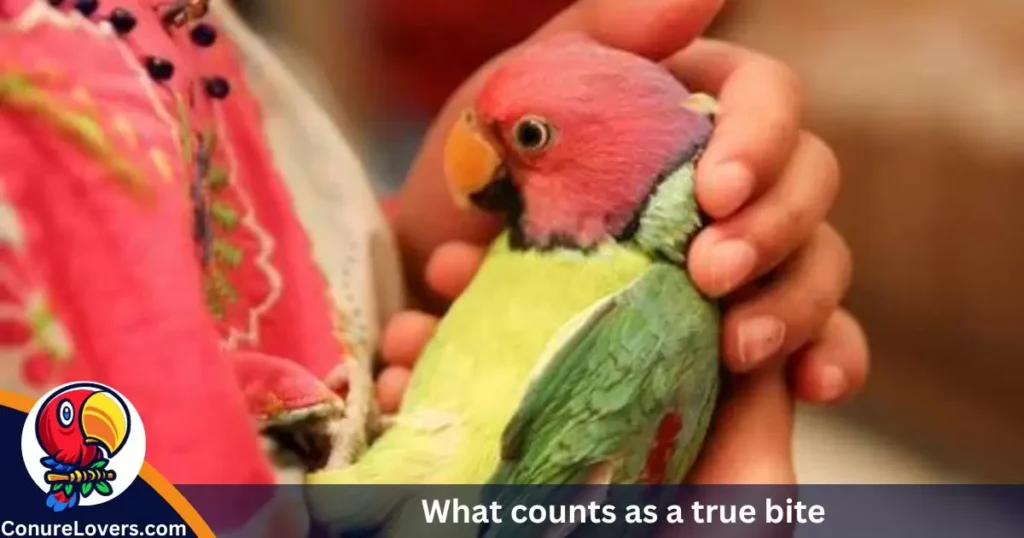
Before figuring out why your parrot bites, it’s important to understand what a real bite means. Parrots usually bite when they feel scared or vulnerable, not because they’re being mean.
Biting isn’t about showing dominance; it’s a way for them to protect themselves, especially since parrots are prey animals.
A genuine parrot bite happens quickly and can be pretty strong. Parrots can put a lot of force into one bite, possibly causing injury. When a parrot bites, you might notice ruffled feathers and signals like eye pinning – signs that it wants some space.
It’s often a self-defense move, and if there’s an injury, that tells you it was a true bite, not just a nip. Understanding this helps you respond to your feathered friend better!
Why is my tame parrot suddenly biting me?
Even if birds are well-behaved and never bit before, they might suddenly nip you, and it can be quite surprising. This can be triggered by some unexpected changes that catch you off guard. For bird owners who are used to their feathered friends being gentle, this sudden biting can be a bit unsettling. But it’s crucial to understand why even a usually tame bird might start nipping, even if it seems unusual. Here are some situations that could be behind your tame bird’s sudden biting:
Changes in the Environment:
Think about whether you’ve moved the cage or rearranged the toys. Some owners noticed biting after changing their appearance – like getting a major haircut, dying hair, or even applying nail polish! Check out the video below where Loki and Freya got wary of the bandage on my thumb and wanted to give it a nip!
Understanding these situations can help you figure out why your friendly bird suddenly turned into a nibbler.
When your bird is not receiving the right nutrition
Several behavioral issues in birds can stem from an imbalanced diet. When birds lack essential nutrients, it can result in problems like challenging molting, irritability, low energy, moodiness, and more.
Transitioning your bird’s diet from seeds and treats to healthier meals may feel challenging, but the positive outcomes are worth it. Before making any changes, it’s crucial to research and consult with your vet. You wouldn’t want to switch your bird’s diet only to make it less healthy.
Hormonal or seasonal changes
This is something important to keep in mind. The time when your parrot reaches adulthood depends on its species. When parrots become adults, they go through hormonal changes that can make them feel frustrated and irritable, especially during certain times of the year.
It’s important to know what things might make your bird’s hormones go wild and keep them away to prevent any unnecessary behavior. During these times, giving your parrot more space is a good idea to avoid them getting too worked up.
Also, you can distract them by playing or training to keep them from getting frustrated and biting.
Illness or Physical injury
Before figuring out why your parrot is biting, it’s crucial to rule out injury or illness. If your bird isn’t feeling well, it might not be up for interactions and could bite if pushed. A usually friendly bird suddenly biting or avoiding contact might be a sign of illness.
If you observe your bird acting unusual, lethargic, or out of sorts, it’s essential to take them to the vet right away.
What to do (and not to do!) when your parrot bites
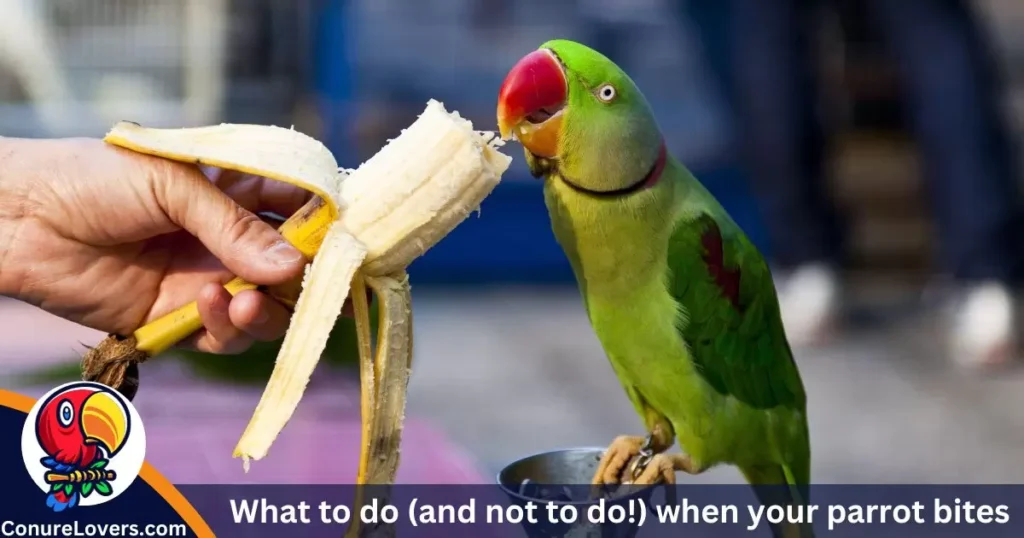
A parrot’s bite can be serious, causing injury, infection, and bleeding. Understanding why your parrot bites is the first step, followed by taking remedial actions to correct this behavior. Here are some do’s and don’ts to prevent biting in the future:
Do: Be calm
If your bird bites, stay calm, especially if it’s a new parrot and the bond is still forming. Firmly rebuke it using words like “no” and lower your tone of voice. Over time, the parrot may associate your disapproval with a drop in your voice and the presentation of your finger.
Don’t: React in a big way!
Ignoring the behavior can be effective. Some parrots see a yelp or significant reactions as rewarding, potentially leading to more biting. When the parrot realizes that biting doesn’t result in attention, it may stop.
Do: Analyze the situation
Parrots may bite to communicate negative experiences. Analyze each biting incident, noting surroundings and actions. Spotting trends helps identify the reasons for biting. For example, Freya, a parrot, disliked a T-stand perch due to it bumping into her cage. Being mindful reduced her aversion.
Don’t: Push the boundaries!
Parrots, being prey animals, may bite defensively if you encroach on their space. Pushing boundaries won’t improve the situation; it may lead to fear or frustration bites.
Do: Train your bird patiently
The “time-out” method involves putting the bird back in its cage after biting, allowing it to calm down before interaction resumes. This can discourage biting as it associates the act with no playtime.
Don’t: Be abusive or hurt your bird!
Stay calm if bitten; avoid hitting or grabbing the beak. Flicking the beak can be negative for the bird. Positive punishment, like adding an undesirable experience, may worsen the biting behavior.
If all else fails…
Some parrots, especially those with prior trauma, may take time to trust. Patience and positive experiences are crucial. Understand your bird’s unique needs, and distractions like toys or treats can help in emergencies.
Remember, building trust takes time, and a fearful parrot may require extra effort. Be patient and consistent in creating positive experiences to reduce biting.
Parrot bite force
The force of a parrot’s bite varies based on factors such as the bird’s size and beak structure. Larger parrots like macaws and cockatoos are known for having strong bites, but even small or medium parrots can cause skin breaks and bleeding with their bite force.
Parrots typically bite in two ways based on personal experience: a quick, hard pinch that pierces the skin or a “**bite and hold on**” with repeated hard chews using the side of the beak. The second type can be especially painful, resulting in tears, bleeding, skin tears, or bruising.
The level of pain and the extent of injury may also depend on whether the bird has recently sharpened its beak. A bite may be more painful if the parrot has a polished, angled beak edge from rubbing it against a perch.
While discussions about parrot bite force acknowledge the pain, it’s emphasized not to obsess over it. Instead, the focus should be on corrective actions to prevent bites.
Can parrot bites cause infection?
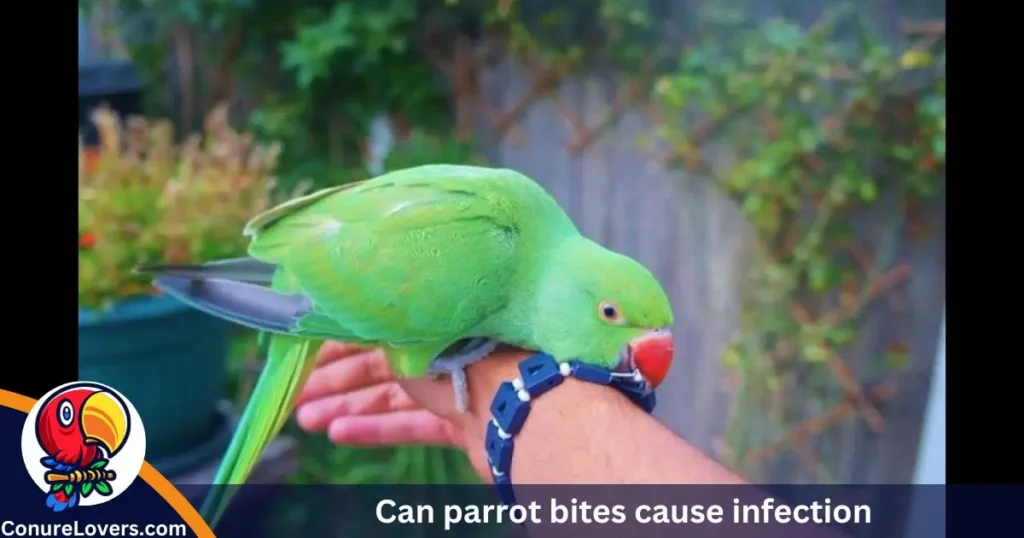
Occasionally, there is a rare possibility of infection from a parrot bite, commonly known as parrot fever or psittacosis. However, for you to contract this infection, the bird itself must be already infected.
Common symptoms include fever, nausea, cough, fatigue, diarrhea, and body pain. If you suspect either yourself or your bird to be infected, it is crucial to seek advice from a doctor (for yourself) or a vet (for your bird).
Apart from zoonotic diseases, infections can arise from secondary causes, such as inadequate cleaning or treatment of the wound or contact with contaminants or allergens that worsen the condition.
How to treat a bird bite
Depending on whether the bite breaks your skin, immediate cleaning and irrigation are essential. The severity of the wound determines the treatment method. For minor cuts and superficial skin tears, applying a small bandage can protect it from inflammation. I often use aloe vera gel to soothe the area and speed up healing. In the case of major or deep cuts, seeking treatment at a hospital or local clinic is recommended.
For cases involving secondary infections or potential zoonotic transmission (spread of bird diseases to you through the wound), comprehensive checks and a treatment plan may be necessary based on your doctor’s advice.
Final notes
So, now you know all that is important about a bird bite. Remember it’s all about treating your bird with respect and love. Punishment and harsh words may not do much against a parrot bite, as would a strategic plan for behavior modification. Here are some things to keep in mind:
- Parrots don’t generally bite out of malice or aggression. Their biting behavior is generally caused due to either a protective instinct or for self-defense reasons.
- There is a difference between a parrot bite and when your parrot is beaking you. Beaking should not be punished and should be differentially treated from a bite.
- If you are wondering how to train a parrot not to bite, there are various methods for behavior modifications that you can follow.
- Parrot bites generally don’t cause infections unless the parrot itself has a zoonotic disease.
- With kindness and love, you will soon be able to understand why your parrot is biting you, and find ways to train it not to bite!

It’s Ethan Richards, your Feathered Pal Expert from “Conure Lovers.” Let’s embark on a delightful adventure of conure companionship. I’ll share practical tips to ensure your feathered buddy lives a happy and healthy life.
